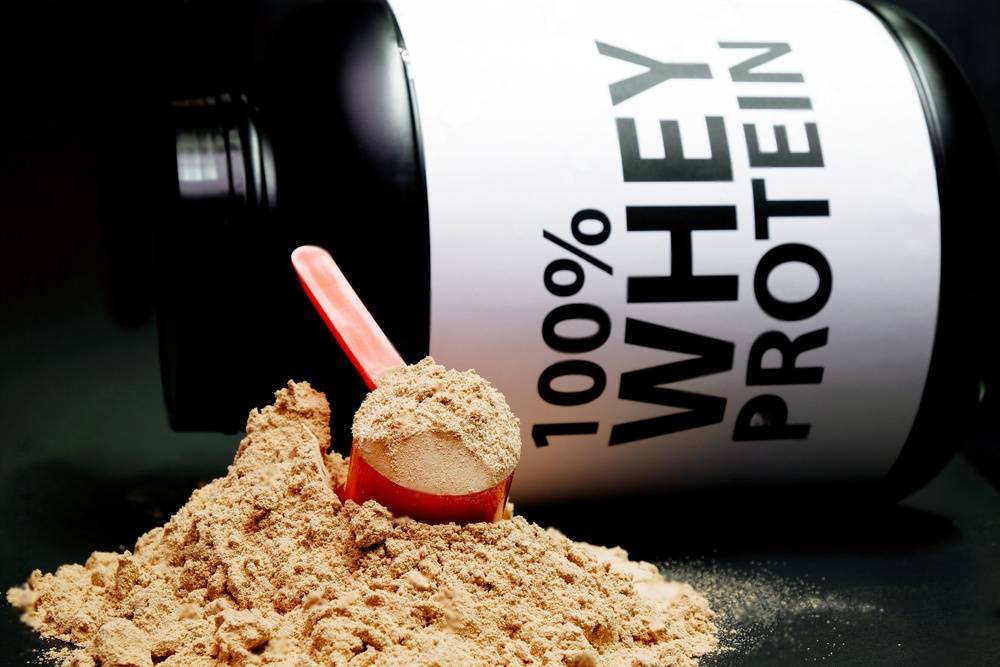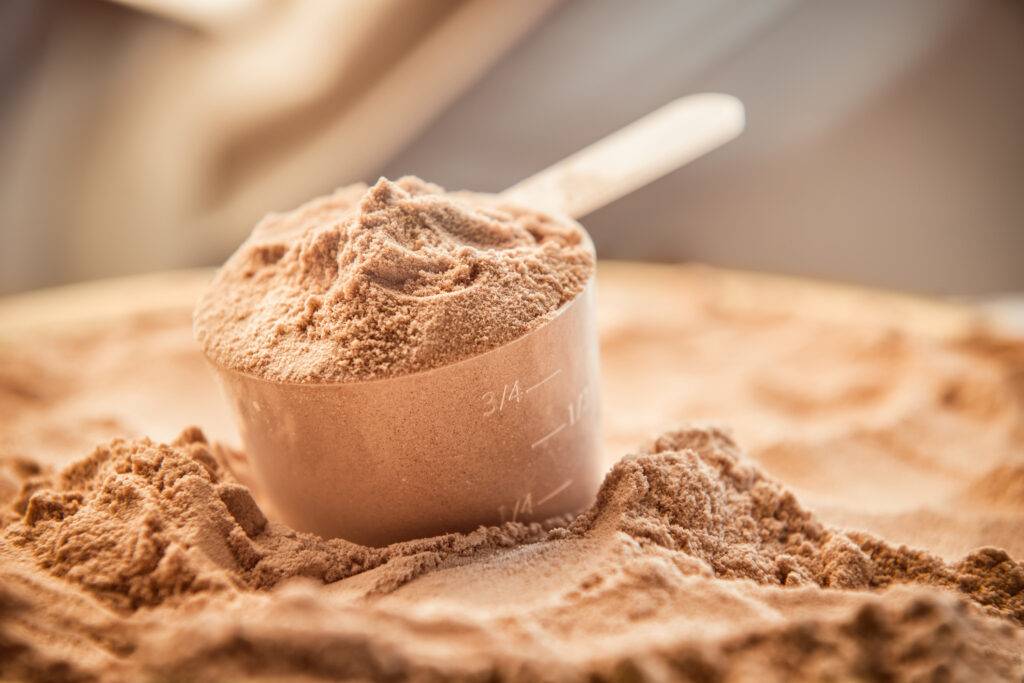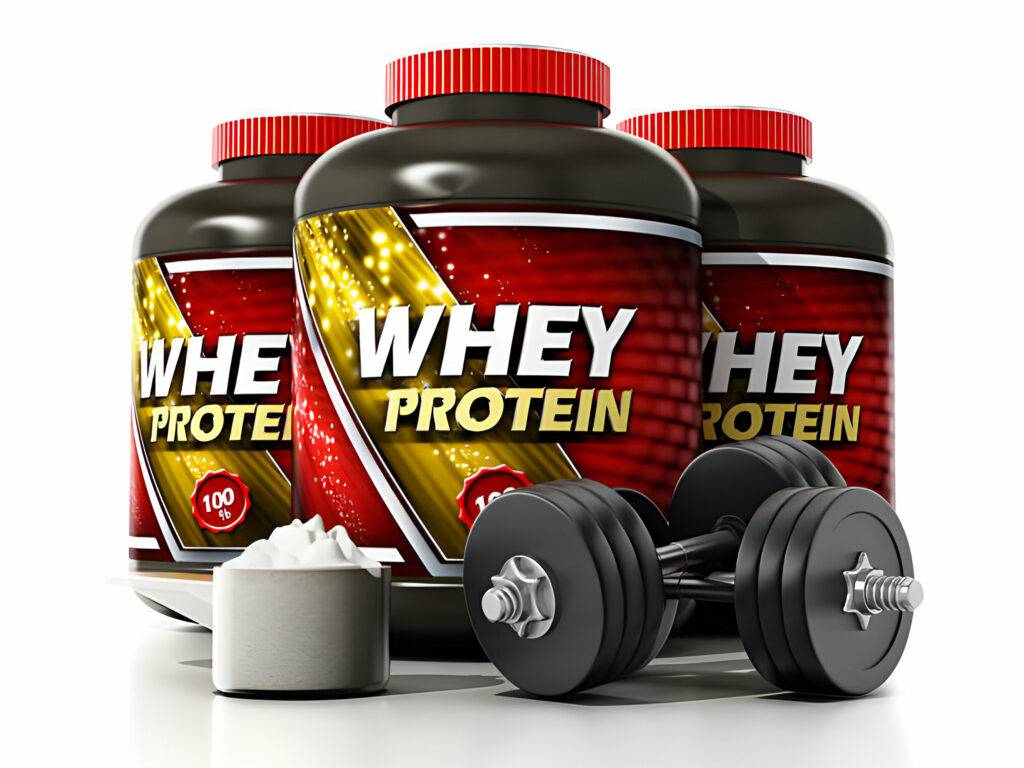
Table of Contents
Toggle
Whey Protein Overview
Whey protein, a popular supplement, is known for its ability to increase muscle growth and speed up post-workout recovery. It’s an excellent alternative for people seeking lean muscle rather than fat. Furthermore, it may benefit men struggling to gain weight, providing a healthier alternative to just increasing calorie intake. Vegetarians who do not get enough protein from their diets can benefit from adding whey protein. Notably, it’s an excellent choice for individuals looking to increase their energy levels without consuming too much sugar.

What is Whey Protein?
Whey protein (a liquid substance) is a by-product of milk. It provides the body with essential amino acids. Whey protein has fewer calories and is quickly absorbed by the body making additional fuel readily available, especially in the time of any physical activity. Whey protein is higher in leucine content which is one of the most important amino acids for muscle growth.
Types of Whey Protein
Whey Protein comes in three main varieties and they are Whey Protein Concentrate (WPC), Whey Protein Isolate (WPI) and Whey Protein Hydrolysate (WPH) respectively.
Whey Protein Concentrate ( typically 35%-80% of protein by weight) is the least processed form, retaining some lactose (milk sugar) and fat along with the protein. Whereas, Whey Protein Isolate (ranges from least 90% of protein by weight) is further processed to remove most of the lactose and fat leading to a higher protein content. Lastly, Whey Protein Hydrolysate (typically 90% to 100% protein by weight) is the most extensively processed and is pre-digested into smaller protein fragments (also known as peptides) for even faster absorption.

Core benefits of Whey Protein
Whey protein as a supplement can improve athletic performance, muscle strength, and mass. If you just need one supplement, whey protein should be at the top of your list. Furthermore, whey protein is a popular milk alternative for people with lactose sensitivity. It is preferable over milk for patients suffering from obesity and excessive cholesterol levels.
It’s important to grasp how whey protein functions – it provides an extra energy boost without adding excessive calories. This is due to its unique composition and digestion process. Unlike many other sources of energy, such as sugary snacks or high-calorie foods, whey protein is a highly concentrated source of protein with minimal carbohydrates and fats.
Protein is essential for the body’s energy production and muscle repair processes. When consumed, whey protein is broken down into amino acids, which are then absorbed into the bloodstream and transported to cells throughout the body. Here, these amino acids are used as building blocks for various metabolic processes, including the production of energy.
Unlike carbohydrates, which provide a quick but short-lived burst of energy followed by a crash, protein provides a more sustained release of energy. This is because protein takes longer to digest and metabolize, resulting in a slower and more steady release of energy over time.

Other benefits of Whey Protein
Apart from these, whey protein:
-
- May help to relieve protein allergies.
-
- May help to reverse weight loss among people who have HIV or AIDS.
-
- Eases the symptoms of asthma.
-
- Boosts the immune system.
-
- May help prevent heart disease, bone loss, and diabetes.
-
- May also help in weight loss by suppressing appetite and regulating blood sugar levels.
However, the above benefits in bullet points do not have strong scientific evidences, and therefore further researches are needed to be conducted regarding them.
It’s important to recognize that whey protein is a safe supplement, often recommended even for individuals battling serious illnesses to help maintain weight and energy levels. Professionals regard whey protein as the optimal way to support your body’s energy needs.
During periods of illness, weight loss isn’t the only concern – muscle mass can also diminish. Whey protein plays a crucial role in addressing this issue. It’s not merely about filling up; whey protein provides the essential proteins your body needs to respond positively. As a result, your immune system strengthens, helping you fend off complications associated with immune system dysfunction.
Form and Dosage
The prescribed dosage for weight lifters or bodybuilders is between 1.2 and 1.5 grams per kilogram of body weight. Whey protein is often taken orally, and mixed with water to make a protein drink. One to two daily drinks, or roughly 50 to 75 grams, is recommended for general use. The drinks are easy to make, and the whey powder is simple to measure.
The recommended times to take protein are first thing in the morning, immediately after waking, and within 30 minutes of working out. Other ideal times to take whey protein are 30 minutes before a workout or in between meals as a snack. Those who are sick are highly recommended to consult with their respective health professionals about the appropriate dosage.

Safety and Precautions
Before you start taking whey protein as a supplement, it is always recommended to consult your dietitian/nutritionist/doctor so that you can discuss the guidelines as to the correct amounts needed to suit your health based on your age and body mass index (BMI).
Consuming whey protein at a moderate level is considered to be safe for adults. However excess consumption of whey protein may lead to nausea, diarrhea, cramps, bloating and other digestive problems. Remember that you cannot build muscles more quickly by consuming excessive whey protein as our body is not accustomed to this. Building muscle takes time, patience, discipline and most importantly consistency.
Counter Indications
Whey protein is not recommended for people who are taking Levodopa, a drug for Parkinson’s disease. Whey protein also reduces the effectiveness of Levodopa and, to a lesser extent, also that of other drugs, such as alendronate (Fosamax) and antibiotics like Ciprofloxacin (Cipro), Norfloxacin (Chibroxin, Noroxin), and Enoxacin (Penetrex). It is still possible to take alendronate (Fosamax) and whey protein but allow at least two hours between drug intake and the drinking of whey protein. In the case of antibiotics, take them at least two hours after and four hours before drinking whey protein.
Whey protein may also be good for people who have diabetes as it can lower blood sugar levels. Caution is general advice for people who are taking any form of medicine that lowers blood pressure, glucose level, and even cholesterol level.

In Conclusion
Whey protein stands as a versatile and widely embraced supplement renowned for its numerous health benefits and practical applications. Its ability to enhance muscle growth, aid in post-workout recovery, and provide a convenient source of protein make it an invaluable asset for athletes, fitness enthusiasts, and individuals seeking to maintain a healthy lifestyle.
With its various forms—concentrate, isolate, and hydrolysate—whey protein offers flexibility in meeting different dietary needs and preferences. Whether it’s supporting muscle development, boosting energy levels, or assisting in weight management, whey protein emerges as a comprehensive solution.
Moreover, its safety profile, when consumed in moderation and under professional guidance, underscores its suitability for a broad range of individuals. However, it’s essential to heed precautions, especially regarding interactions with certain medications and potential adverse effects from excessive consumption.
While further research continues to explore its potential benefits in areas such as heart health, immune function, and disease management, the existing evidence highlights whey protein’s significant contributions to overall well-being.
Ultimately, whether it’s aiding in athletic performance, supporting recovery, or addressing specific health concerns, whey protein remains a trusted ally for individuals striving to optimize their physical health and fitness journey.



Pingback: The 5 best types of protein powder explained in 2024
Pingback: Ghost Protein Powder: The Only Guide You Will Ever Need!
Pingback: Just Ingredients Protein Powder Reviews: My Honest Take
Pingback: Good Protein Powder for Runners: My Top Picks
Pingback: Can You Mix Coffee with Protein Powder? Here's How
Pingback: Does Protein Powder Expire? The Ultimate Guide to Shelf Life
Pingback: Can Protein Powder Make You Constipated? The Truth
Pingback: Is protein powder bad for your kidneys?
Pingback: Unleash Your Fitness Potential: 10 Game-Changing Benefits of Whey Protein Isolate
Woah! I’m really enjoying the template/theme of
this website. It’s simple, yet effective. A lot of times it’s tough to get that “perfect balance” between user friendliness and appearance.
I must say you have done a excellent job with this.
In addition, the bllog loads extremely quick for me on Internet explorer.
Superb Blog! https://odessaforum.biz.ua/
Glad you liked it. Appreciate your comment. 🙂
Pingback: How Is Protein Powder Made? Process Explained
Pingback: Casein Protein vs Whey Protein: The Best Guide On The Internet!